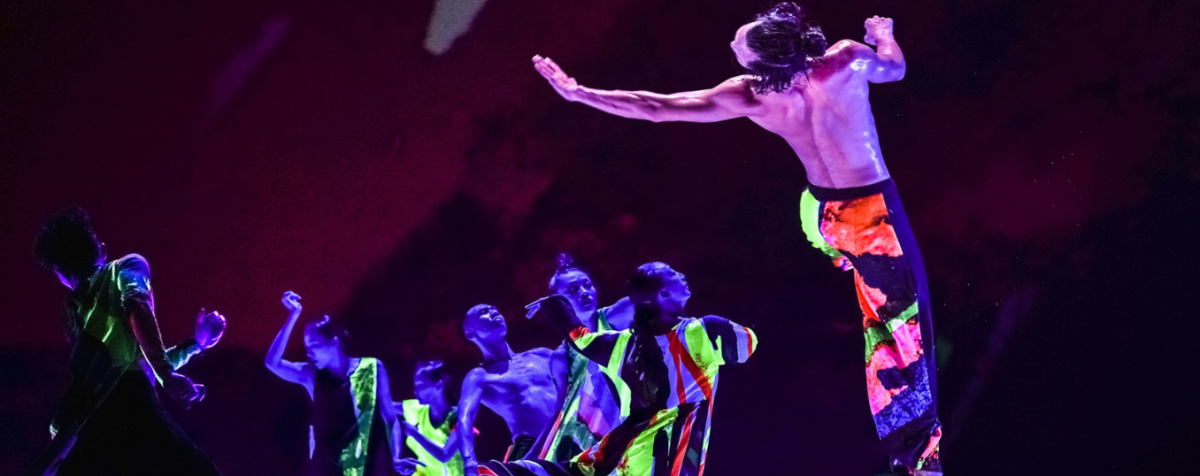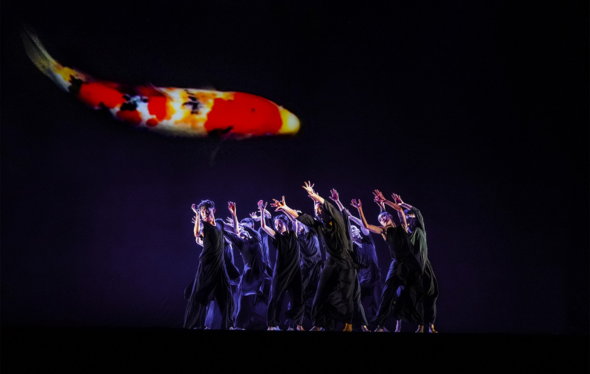Cloud Gate Dance Theatre of Taiwan
Acclaimed as “Asia’s leading contemporary dance theater” (The Times), Cloud Gate Dance Theatre of Taiwan transforms ancient traditions such as meditation and martial arts into a thrilling and modern celebration of motion. Their production, 13 TONGUES, takes the audience on a visually arresting exploration of cultural memory.
About Cloud Gate: Cloud Gate is the name of the oldest known dance in China. In 1973, choreographer Lin Hwai-min adopted this classical name and founded the first contemporary dance company in the greater Chinese-speaking community. In 2020, Cheng Tsung-lung succeeded Lin as the company’s Artistic Director. In 2023, Cloud Gate celebrated its 50th anniversary.
Cloud Gate has set out to engage with local history, culture, and subject matter and draws on classical, folk, and modern dance from both Western and Asian traditions. Its dancers receive training in meditation; Qi Gong, an ancient breathing exercise; internal martial arts; modern dance; and ballet. Under the leadership of CHENG, the training has expanded to more dancing styles, such as street dance. Manifesting in choreographies, the company transforms ancient aesthetics into a thrilling and modern celebration of motion.
Cloud Gate has toured worldwide with frequent engagements at the Next Wave Festival in New York, the Sadler’s Wells Theatre in London, the Moscow Chekhov International Theatre Festival in Russia, the Movimentos International Dance Festival, and the Internationales Tanzfest NRW, directed by the late Pina Bausch in Germany. The international press acclaims the company as “One of the best dance companies in the world” (FAZ). Cloud Gate was honored as the “Outstanding Company” for the 2018 National Dance Awards (UK).
About 13 TONGUES: As a child in the 1980's, Cloud Gate Artistic Director Cheng Tsung-lung would contribute to the family business by helping his father sell slippers on the streets of Bangka/Wanhua, the oldest district of Taipei. Bangka/Wanhua was known for its vibrantly diverse and bustling street scene that embraced religious and secular life, rich and poor, work and play, legal and illegal activities. The young Cheng was transfixed by his mother’s accounts of the legendary 1960's street artist and storyteller known as “13 Tongues” who had adopted Bangka/Wanhua for his informal stage. It was said that “13 Tongues'' could conjure up all the Bangka/Wanhua characters - high and low born, sacred and profane, men and women - in the most vivid, dramatic, and fluently imaginative narratives. Thirty years on Cheng's fascination for “13 Tongues” became his inspiration as he transformed his childhood memories into dance.
Beginning and ending with the sound of a single hand bell, the music accompanying 13 TONGUES ranges from Taiwanese folk songs to Taoist chant to electronica. The stage is awash with projections of brilliant colors, shapes, and images and the dancers gather, interact, separate and re-gather in a thrilling representation of the clamor of street life. As the religious heritage of ancient Bangka/Wanhua fuses with the secular space it is today so time appears to dissolve. The spirit realm and the human realm also coalesce as the audience is taken on an immersive journey - via imagination and storytelling that recalls the art of “13 Tongues” - through centuries of human endeavor, behaviour, and belief.
The production is commissioned by National Performing Arts Center-National Theater & Concert Hall in Taipei, and the tour is made possible in part by grants from the Ministry of Culture and the Republic of China (Taiwan). Photos by Liu Chen-hsiang.

